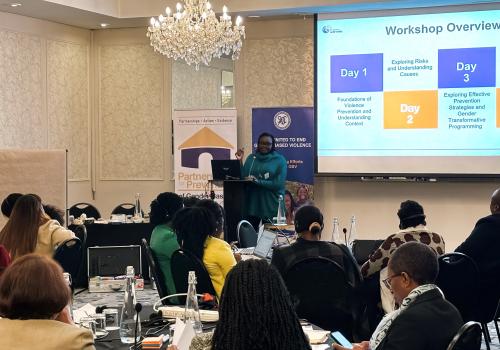Southern African Development Community (SADC) hosted a four-day capacity building workshop on the Prevention of Gender-Based Violence (GBV), from 10 to 13 June 2025 in Johannesburg, South Africa. Held in collaboration with GIZ Partnerships for Prevention of Gender Based Violence in Southern Africa (PfP) Programme, the workshop brought together representatives from SADC Member States drawn from Ministries of Gender and Civil Society Organizations active in GBV prevention and programming. The training workshop was held in line with Objective 3 of the SADC Strategy and Framework of Action for Addressing GBV (2018-2030) which states that capacity building of key stakeholders and service providers is important for the prevention and provision of quality and comprehensive services.
The training equipped participants with practical skills to design, implement, and monitor country-specific GBV prevention programmes that address the root causes and contributing factors of GBV.
In her opening remarks, the SADC Gender Unit representative Ms Kealeboga Kelly Dambuza-Chifani underscored GBV as a significant obstacle to achieving national and regional development goals. She emphasised that GBV undermines the rights and potential of women and girls, and all those affected, limiting their participation in the region’s socio-economic development progress. Ms Dambuza-Chifani noted that feedback from the Member States and regional studies highlights a lack of sustained effective GBV prevention efforts, particularly in tackling harmful cultural or religious beliefs that perpetuate violence. As a result, the prevention of GBV remains a core priority within SADC’s broader regional integration agenda.
She also recalled that in 2022, the SADC Secretariat, with the support from development partners developed a Handbook to Promote Effective GBV Prevention Initiatives in the SADC Region, a tool to guide Member States in implementing evidence-based prevention programmes.
Over the four days session, participants were trained to identify country-specific risks and protective factors; review proven GBV prevention strategies; and strengthen multi-sectoral collaboration. Led by Dr Lina Digolo,the workshop also provided valuable knowledge exchange and cross-country learning. Participants expressed appreciation for the training and showed enhanced understanding of the difference between GBV prevention and response to GBV. They also called for SADC to support capacity building at the national level to enable the scaling up of effective GBV prevention interventions.
In her closing remarks Ms Dambuza-Chifani, applauded the participant’s commitment to their national-levelefforts and highlighted the importance of documenting and and managing knowledge to strengthen future programming. A total of 28 delegates from Member States received certificates of participation in the training.

